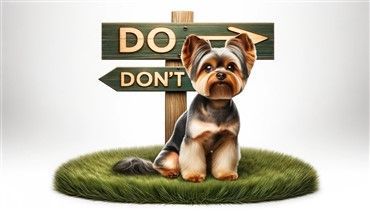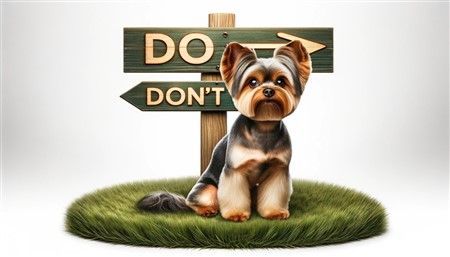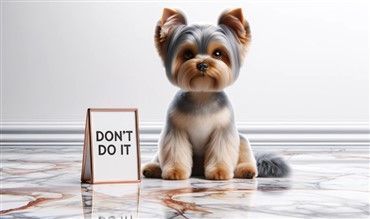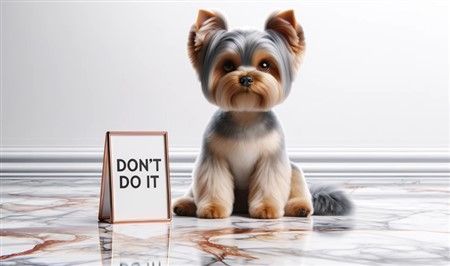Yorkshire Terrier Do's and Don'ts
Overview


Please note: YorkieInfoCenter is reader-supported. Some links below are affiliate links, meaning we may earn a small commission on products through these, at no extra cost to you.
The Top 5 Yorkshire Terrier Do's
#1 Do take care of your Yorkie's teeth.
What to know:
Yorkshire Terriers are prone to dental problems. Without regular care to clean away plaque and tartar, there can be a host of painful and sometimes dangerous issues down the line: Tooth decay and infections, gum disease, bone loss in the jaw, and/or tooth loss.
What to do:
One of the most effective ways to help keep a Yorkie’s teeth clean is brushing. If your Yorkie can learn to tolerate this, it should be done daily. Since this breed is so tiny, a ‘puppy-sized’ toothbrush or fingertip brush (a doodad that slips over your index finger) should be used along with non-foaming, fluoride-free canine toothpaste that is safe to be swallowed.
For this, a set like the
Nylabone Advanced Oral Care Dental Kit has everything you need to get started. Please note that we recommend the 'puppy' size kit for Yorkshire Terriers 10 lbs. and under.
There are also dental sprays that can work to some degree, if used daily and often in conjunction with other methods. For example,
Arm & Hammer Dog Dental Care Spray can work well when sprayed directly on both teeth and gums up to twice per day.
Dental chews can also be effective, though it’s also best to use these alongside brushing or sprays and not in place of them. One of the most popular dental treats,
Greenie Teenie Dental Treats, are sized for dogs 5 to 15 lbs.; do note that these should be given under supervision since hard bits can break off and should be disposed of.
In addition, speak to the veterinarian regarding professional dental examinations and cleanings.
#2 Do make sure your Yorkie receives regular exercise.
What to know:
Small dogs need daily exercise; this is not just important for larger breeds. In regard to physical health, regular exercise helps keep the heart healthy, the metabolism functioning properly, aids in good digestion and healthy bowel movements, promotes a good appetite, helps with muscle maintenance, keeps supporting ligaments (to the knees and hips) in good shape, helps maintain proper bone density, helps prevent certain diseases including canine diabetes and can delay the onset of osteoarthritis.
It’s also important for emotional health; it helps a dog release pent-up energy and can decrease reactionary behaviors (barking, jumping, etc.) via repeated exposure to stimuli.
What to do:
Keep your Yorkie moving with daily exercise. Walks are one of the best methods since the pace can easily be controlled and going from Point A to Point B offers a goal for both dog and owner.
Aim for 2 walks per day, lasting anywhere from 20 to 40 minutes each, and this should be at a pace that is brisk for your particular Yorkie.
Another good option is rousing games of fetch that allow for some controlled running. This can be played outside on a long leash or within an enclosed area or indoors down a hallway or in a large room. Yorkies typically love to chase after things, so the only necessity is some enthusiastic tossing of fun toys like colorful
Midlee X-Small Tennis Balls for Dogs.
#3 Do offer top-quality meals and snacks.
What to know:
There are several types of ingredients commonly found in dog food that are linked to both short and long-term health issues and should be avoided. Additives including synthetic preservatives and artificial flavoring and coloring are linked to everything from allergic reactions to neurological disease. And high gluten levels, fillers (like feed-grade corn and cereals), and meat by-products often point to subpar food.
What to do:
If you are not 100% confident in what your Yorkie eats, reassess things.
If you enjoy cooking, preparing homecooked food for your Yorkie is an option. Doing so allows you to have complete control over the ingredients and recipes can be adjusted to a dog’s particular taste.
And, if you prefer the ease of kibble and manufactured snacks, there are some good options. Healthy Extension Little Bits, WholeEarth Farms, and the
line of Wellness Complete dry kibble, soft snacks, and baked treats are excellent. These are 100% all all-natural with no artificial preservatives or additives and include wholesome ingredients like quality meats, vegetables and fruits (like blueberries for important antioxidants).
#4 Do offer positive reinforcement for any sort of training.
What to know:
In many cases, dogs that struggle to learn new concepts and pet parents that have trouble teaching new skills have one thing in common: a lack of consistency that misses the target of positive reinforcement.
What to do:
When it comes to teaching your Yorkie just about anything (commands, housebreaking, heeling, staying calm when visitors arrive, etc.), the most effective methods almost always involve marking the desired behavior or action with praise and reward.
The praise should include the action; example: “Good sit, good boy!” or ‘Good heel, good girl!”. And the reward should be a high-value training treat.
Keep in mind that training treats are different than snacks. They are designed to be very small (so that consecutive rewards do not fill a dog up), and are typically soft, chewy tidbits that are packed with flavor. In following the guidelines of no by-products, no artificial additives, and more, one of our favorites is
Wellness Grain Free Training Treats. Note that for very tiny Yorkies, you can break these treats into thirds or halves, if needed.
#5 Do be proactive regarding joint health.
What to know:
This is not an issue reserved for very senior dogs. In fact, if your Yorkshire Terrier is 6 years or older, this ‘Do’ tip applies.
Cartilage is the connective tissue between joints (like knees, elbows, hips) that serves as a cushion to create fluid, pain-free movement. Glucosamine and chondroitin are natural compounds found in the body that keep that cartilage healthy.
As a dog ages, the body produces less glucosamine and chondroitin. In turn, cartilage wears down, bones start to rub together, and there is inflammation, joint pain and stiffness. This condition is referred to as osteoarthritis.
The natural decline of the joint-friendly compounds of glucosamine and chondroitin can start as early as 6 years old for toy breeds and other canines. And 80% of dogs 8+ years are affected by some level of osteoarthritis.
What to do:
There are several things you can do to help prevent your Yorkie from suffering from this painful (and often eventually debilitating) disease.
Prevention includes keeping your Yorkie at a healthy weight (usually not an issue for this breed), providing regular exercise (see previous ‘Do Tip #2’), limiting actions that can cause joint or bone injury (like jumping down from furniture – see ‘Don’t Tip #2', ahead), and offering joint supplements.
One effective joint supplement is
Doggie Dailies Advanced Hip and Joint Supplement for Dogs, which has both glucosamine and chondroitin, along with CoQ10, MSM, hyaluronic acid and omega 3 (all of these are compounds that also support joint health).
Note: If your Yorkie is 8 years or older, you suspect or there is already a diagnosis of osteoarthritis, speak with the vet. Aside from a joint supplement, additional treatment options including mobility accessories, massage, and a wide range of prescribed medications.
The top 5 Yorkie Don'ts


#1 Don't give your Yorkie unfiltered tap water.
What to know:
Reasons to avoid unfiltered tap water seem to grow every day.
It’s been known for a while now that unsafe levels of Chromium-6, a known carcinogen, is in the tap water of over 200 million Americans (across every state), along with everything from pesticides to disinfectant byproducts and even traces of prescription drugs.
And in the United States, and other countries, the presence of contaminants like lead, cadmium, mercury, and benzene in tap water raises significant concerns for canine health. Ingestion or exposure can affect the nervous system of dogs, leading to behavioral changes and cognitive impairment. Benzene, a carcinogenic substance, poses a risk of blood disorders and cancer.
PFAS, known as "forever chemicals," are durable pollutants found in many elements including tap water. While much more research needs to be done, exposure may cause health issues like weakened immunity, developmental and reproductive issues, and increased disease risk, including liver and kidney damage.
What to do:
While it cannot eliminate all impurities, providing your Yorkie with spring water or filtered water is advisable. There are several good choices for accomplishing this. You can purchase spring water in various sizes, refill portable bottles at municipal wells (if this is available in your area) or filter water by connecting a filter device to your kitchen tap, or use a filtering pitcher like the ZeroWater 5-Stage Water Filter Pitcher.
#2 Don’t let your Yorkie jump down from heights.
What to know:
When toy breed dogs like the Yorkshire Terrier jump down from sofas, chairs, or other furniture, they are often leaping down 2 to 3 times their height. Short term, this can cause muscle and/or ligament twists or strains, especially if the floor is hard and slippery (tile, wood, etc.). And the biggest concern is a leg fracture or break, which happens much more often than many pet parents assume. In addition, chronic jumping can cause wear and tear of the ankle, knee, and hip joints.
What to do:
If your Yorkie generally ends up on furniture to snuggle with you when your home, work on training them to wait for your assistance to get down. And if your Yorkie has a habit of getting up and down by themselves on a sofa, chair or other furniture, consider placing pet steps or a ramp, like Adjustable Wooden Pet Ramp by Sweetbin against their favorite resting spot.
#3 Don't let your Yorkie wear a collar while on a leash.
What to know:
Toy breeds like the Yorkshire Terrier are prone to collapsed trachea, a condition in which the tracheal rings surrounding the windpipe collapse inward, often causing severe breathing issues. Though weak tracheal bones are a genetic issue, one of the treatment methods, which is keeping pressure off the neck, is also one of the prevention methods.
What to do:
Do not attach your Yorkie’s leash to their collar; doing so causes pressure and strain to be placed directly onto the trachea. Use a harness vest instead; they distribute tension across the much-stronger back, chest and shoulders, leaving the neck free. As an added plus, a harness can make walking a dog a lot easier since it allows you much better control.
One of our favorite harnesses for a Yorkie is the EcoBark Step-in Harness. It's super-easy to place on, is breathable, comfortable and durable and best of all starts at size triple-small (for dogs 2 to 4 lbs.), so there's a size for every Yorkie.
#4 Don't skip veterinary wellness checks.
What to know:
Routine veterinary wellness checks play an important role in helping to keep a Yorkie healthy. Via blood and stool testing, a urinalysis, and a physical examination, the vet will be able to screen for common canine conditions, many of which are ‘silent issues’ that often do not have obvious symptoms in the early stages. Early detection offers the best chances for a good prognosis and successful treatment.
These checkups are also a good opportunity for you to discuss any concerns you have regarding behavior, diet, exercise, mobility, etc.
What to do:
Make and keep wellness appointments. For Yorkies under 8, this will be once a year. For those 8 years and older, this will be twice-per-year.
For many pet parents, the sudden cost of a checkup for their dogs can be tricky to manage, so putting aside a smaller amount each month can help. The base cost of an exam is in the $75 range, but various tests can be additional. Playing it safe by saving $200 for a wellness checkup means tucking away just $17 a month.
#5 Don't stop puppy-proofing the house, no matter your Yorkie's age.
What to know:
Though puppies are notorious for mouthing and chewing on everything in reach, adult dogs may do this as well, and sometimes without a previous history of doing so. Mouthing objects usually answers the question of ‘What is this?’ for dogs that are curious or bored, so many non-food items are possible dangers. For dogs in homes not proofed against hazards, risks include choking, intestinal blockage, and poisoning.
What to do:
Routinely go over all floors and pick up small objects. If you drop something, pick it up right away. Place pocketbooks, gym bags, and other belongings out of the way, where your Yorkie can’t reach them. Go through all lower cabinets to either remove anything dangerous or use child-proof locks. Keep small waste baskets out of reach or use secure covers. Place all electrical cords and wires out of reach or use a product like the PetCords Cord Protector
to prevent accidents.
Final Thoughts and a Helpful Summary
How to Clean Your Yorkie's Teeth - This breed is extremely prone to tooth decay and other painful issues that can lead to tooth loss, bone deterioration and more. Follow these tips to keep your Yorkie's teeth clean and healthy.
